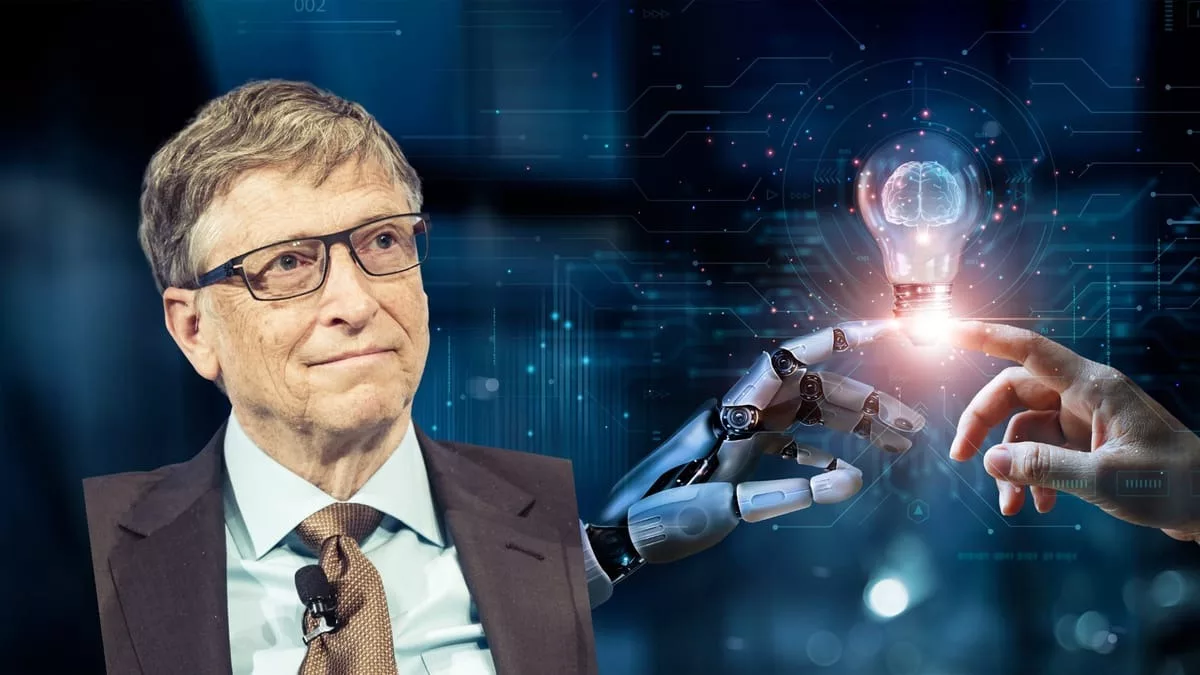
Bill Gates notes on AI
Bill Gates, in a reflective piece, delves into the transformative potential of artificial intelligence (AI) on global progress. This year marked a significant shift for Gates as he transitioned from viewing AI as a novelty to incorporating it into his work, recognizing the immense potential it holds for shaping the future. Gates acknowledges the current era as a period of both excitement and confusion, emphasising the clarity surrounding AI’s capacity to enhance productivity and facilitate broader access to education and mental health care.
Must Read: Microsoft Unveils Copilot: AI Innovations & Potential Revenue Surge
Gates, whose life’s work revolves around the core idea that innovation is the key to progress, draws parallels between his start at Microsoft, the creation of the Gates Foundation, and the substantial improvements in global living standards over the past century, largely attributed to innovation.
The co-founder highlights the profound impact of innovation on child mortality rates since 2000, with advancements in vaccine development playing a pivotal role. Gates emphasises the role of innovation in maximising impact, especially in a world with limited resources. He anticipates that AI will accelerate the rate of new discoveries, particularly in the field of medicine.
AI’s influence on drug discovery stands out, with tools expediting the process significantly. Gates notes that some companies are already developing cancer drugs using AI, and he underscores the Gates Foundation’s focus on leveraging AI to address health disparities affecting marginalised communities, emphasising diseases like AIDS, tuberculosis, and malaria prevalent in low-income countries.
Must Read: Navigating the Future: Health Care Leaders Advocate for AI Regulation and Transparency
The visionary philanthropist expresses his belief in AI’s potential to improve lives in low- and middle-income countries. Gates shares insights from his recent trip to Senegal, where he met innovators conducting pioneering AI research with the goal of benefiting their local communities. Despite being in the early stages, these initiatives lay the groundwork for a substantial technology boom in the coming decade.
Gates applauds the creativity demonstrated by innovators in developing countries, citing examples of AI combating antibiotic-resistant pathogens, assessing HIV risk, and enhancing accessibility to medical information for health workers. Gates highlights poignant examples, such as ARMMAN’s AI-driven model aiding health workers in managing high-risk pregnancies. He acknowledges the long road ahead, acknowledging challenges in scaling up projects and ensuring sustained functionality over time.
While acknowledging the long road ahead for these projects, Gates emphasises the need to address broad risks associated with AI, including preventing bias and hallucinations. He remains optimistic that AI models can be taught to distinguish fact from fiction, pointing to promising work by organisations like OpenAI, a major investment partner of Microsoft.
Must Know:List of Generative AI Models You Need To Know
Defining artificial intelligence: “I think back to the early days of the personal computing revolution, when the software industry was so small that most of us could fit onstage at a conference. Today, it is a global industry. Since a huge portion of it is now turning its attention to AI, the innovations are going to come much faster than what we experienced after the microprocessor breakthrough. Soon, the pre-AI period will seem as distant as the days when using a computer meant typing at a C:> prompt rather than tapping on a screen,” said Bill Gates.
Productivity enhancement: As computing power gets cheaper, GPT’s ability to express ideas will increasingly be like having a white-collar worker available to help you with various tasks. Microsoft describes this as having a co-pilot. Fully incorporated into products like Office, AI will enhance your work—for example, by helping with writing emails and managing your inbox. In addition, advances in AI will enable the creation of a personal agent. Think of it as a digital personal assistant: It will see your latest emails, know about the meetings you attend, read what you read, and read the things you don’t want to bother with. This will both improve your work on the tasks you want to do and free you from the ones you don’t want to do.
To Read Complete Bill Gates Notes on AI and Impact – Click Here
AI in Health: People will need to see evidence that health AIs are beneficial overall, even though they won’t be perfect and will make mistakes. AIs have to be tested very carefully and properly regulated, which means it will take longer for them to be adopted than in other areas. But then again, humans make mistakes too. And having no access to medical care is also a problem.
Education: Computers haven’t had the effect on education that many of us in the industry have hoped. There have been some good developments, including educational games and online sources of information like Wikipedia, but they haven’t had a meaningful effect on any of the measures of students’ achievement.
“But I think in the next five to 10 years, AI-driven software will finally deliver on the promise of revolutionizing the way people teach and learn. It will know your interests and your learning style so it can tailor content that will keep you engaged. It will measure your understanding, notice when you’re losing interest, and understand what kind of motivation you respond to. It will give immediate feedback,” said Bill Gates.
AI pioneer Geoffrey Hinton warns of job losses and inequality due to AI, urging governments…
Learn how RAG enhances the accuracy and relevance of generated content by dynamically integrating specific…
Discover the process of Bitcoin mining, where transactions are verified and added to the blockchain,…
Can you find the mistake in the kids playing picture in 9 seconds? Test your…
Google scientists mapped a cubic millimetre of human brain tissue at nanoscale resolution, uncovering new…
At OpenAI, Prafulla Dhariwal is in charge of the Omni team, and GPT-4o represents their…